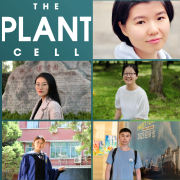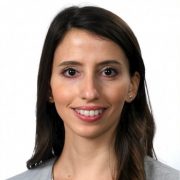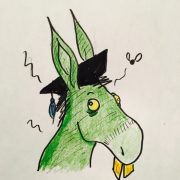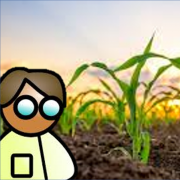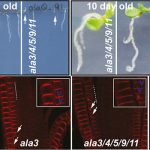Informational Interview with Dr. LaKisha Odom, Scientific Program Director at the Foundation for Food and Agriculture Research (FFAR)
Informational Interview by Marlo Hall, ASPB Conviron Scholar
Please Introduce yourself and give us a sense of your career path.
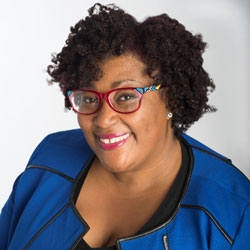 I’m LaKisha Odom, scientific program director for the Foundation for Food and Agriculture Research (FFAR). We are a nonprofit organization, created in 2014, and our overall purpose is to increase the amount of funding for food agriculture research spaces, using public-private partnerships, using non-federal dollars. That’s a general sense of what I do. I hope, in that position, what I do is identify research gaps in the soil health research space specifically. This is organized around 6 strategic research areas, soil health, water management, animal systems, urban agriculture, plant breeding or next generation crops, and the health agriculture nexus. I manage the soil health challenge area, I spend time trying to figure out what the needs are as it pertains to research in those spaces, identifying potential partners, making partnerships and developing the program around that particular issue to finding funding partners. For every federal dollar we spend, we have to find a non-federal match, 1 to 1. So we spend a lot of time aligning strategies, thinking about strategic priorities of other organizations, or other governments, nonprofits, industry, state and local governments, international partnerships, as long as it is not a federal funding source, we can match dollars and efforts with those organizations. We spend a lot of time looking for spaces of alignment and coordination.
I’m LaKisha Odom, scientific program director for the Foundation for Food and Agriculture Research (FFAR). We are a nonprofit organization, created in 2014, and our overall purpose is to increase the amount of funding for food agriculture research spaces, using public-private partnerships, using non-federal dollars. That’s a general sense of what I do. I hope, in that position, what I do is identify research gaps in the soil health research space specifically. This is organized around 6 strategic research areas, soil health, water management, animal systems, urban agriculture, plant breeding or next generation crops, and the health agriculture nexus. I manage the soil health challenge area, I spend time trying to figure out what the needs are as it pertains to research in those spaces, identifying potential partners, making partnerships and developing the program around that particular issue to finding funding partners. For every federal dollar we spend, we have to find a non-federal match, 1 to 1. So we spend a lot of time aligning strategies, thinking about strategic priorities of other organizations, or other governments, nonprofits, industry, state and local governments, international partnerships, as long as it is not a federal funding source, we can match dollars and efforts with those organizations. We spend a lot of time looking for spaces of alignment and coordination.
How and when did you become interested in the plant sciences?
My undergrad degree is in environmental science. I went to a historically black college, and the agriculture department was the department that housed environmental science. So, our environmental science had a lot of soil and plant science, just because it’s the nature of who’s teaching the courses. And a lot of the electives were agriculture electives. So starting in undergrad, just taking a lot of classes in plant science, crop science, soil science, and then there was quite a bit of research happening in genetic modifications at Tuskegee at that time, so getting interested in those spaces, getting interested in ow we feed people, what science needs to effectively feed people. Those things kind of got me into soil and plant science because initially I was really interested in environmental science and what that would look like, and then it took on more of a soil science and plant science tinge to it as I finished up my degree.
What are the most important skills you learned to get where you are today?
I think, listening. So much is dependent upon listening, and actively hearing. One of the things I realized in this particular position was, I have a series of things that I didn’t necessarily think of as skill sets, so much as things that I could do. But when I transitioned into a nonprofit space where you have to build a lot of relationships, they were hidden gems. I always tell folks when I talk to them, you may not think a thing that you can do well is a skillset, but in a certain situation it’s really great. I’ve always been very relationship based, very team focused, very much a person who likes to figure out how to make a win-win situation for as many people as possible, if it’s possible. In a bench setting that’s not a skill set that really matters one way or the other. When you move into a space where 75-80% of what you do is figuring out how to work with other people, having those softer skills is actually a benefit. It’s not something I intentionally cultivated, it’s just a thing that I like. It’s the way I like to work. Since I’ve been in this position, I’ve spent a lot of time cultivating those softer skills of conflict resolution, facilitation, things like that. And really trying to work with people effectively.
What are the skills you have learned since starting this job?
I think what I learned since starting this job is to pull out more of those things, thinking more and more about emotional intelligence, learning more about a holistic view of our food system. At the bench I was very focused on my particular research area, and thinking about how it was handled downstream was not something that I was really focused on. Sitting in this position at FFAR, where we constantly looking at the impact of our research, how we can effectively engage farmers and ranchers, looking at stakeholder engagement, we spend a lot of time thinking about the system as a whole, and how we can effect change from that perspective, versus making one change and then not thinking about the impact of that change. We are always thinking about if we go out and fund research in a particular management strategy, we think about how we are going to adopt it, encourage adoption, how are we going to implement and operationalize. We are always thinking about things like that. Coming from the bench I wasn’t trained that way, but I definitely have to think in that way a lot more now.
What is the most rewarding part of your job?
I think It’s two fold. In the vein of learning things about yourself, and refining how you understand yourself, one thing I realized is that I like the challenge of solving complex problems, that is very exciting to me. I work in a space where that is our charge, is to chase after the most intractable issues, those spaces for innovation and change. So being able to come up with practical solutions to challenges is very exciting and rewarding. And the other piece is, I’m relationship based, so the opportunity to tackle those really challenging problems with a group of people who are like minded, and are excited about effecting change in a similar space, that’s really rewarding to me. The excitement when you see someone who says ‘I was thinking about trying to solve this in the same way’, and then having the ability, because of the way our org works, to provide some resources to pursue those spaces of innovation, of collaboration, is so rewarding to see solutions come to life through partnership.
What are your least favorite or most challenging parts of your job?
Most challenging part is what I just said. I think part of it is when folks are tunnel visioned on the challenges they want to solve, and they aren’t thinking holistically. Let’s be honest, we are in a place where funding for agriculture research is small and not increasing, I don’t even know what the effect of COVID will be on the resources available. It is very human for folks to not want to be as collaborative or open. But in continuing to try to push through that resistance to get to a space where you can think about how much farther you can get by leveraging opportunities and working together, I think that is the space where when you get someone there, it is very rewarding. But it is sometimes really challenging to push past the way we have done work in the past. Sometimes people who have never worked together, and may have a competitive pressure, but when you can actually achieve it, it is so rewarding. It’s sometimes difficult to find the right safe space for everyone to feel comfortable talking and sharing. Sometimes even to get competitive industry partners to share what their challenges are is almost impossible. It’s establishing trust, creating that position of safety, explaining how working together can be beneficial. All those things will get us there, it’s just a process sometimes.
Where does FFAR fit into the industry/academia dichotomy?
I think it’s a bit of a category by itself, because it straddles the two. So there’s a lot of coordination between industry and academia in some small ways. There’s a lot of industry partners that will partner with universities to solve a certain challenge that a particular industry has. Company X might say, ‘we need to know how to get the farmers in our supply chain to do a specific thing’. I think the role that FFAR occupies is to take that question and say, ‘how would you get all farmers in the supply chain to resolve this challenge.’ or identify a number of challenges that are industry sector wide. No one has the resources, expertise or time to devote to solving this problem. Everyone lives with it because no one person wants to be the person that solves the problem for everyone, because everyone would benefit. I think that’s where FFAR sits. We can partner with folks and say this is a problem you all are facing. FFAR will come in and help resolve the problem through research, if you all commit to work together to solve this problem that will benefit all of you. We like to stay in that pre-competitive space. I would say that we sit in the spaces where we can bridge. Most companies are going to be thinking about solving their specific challenge, and not worry about if another company has that challenge, which is fair for them, they don’t have to worry about that. But FFAR asks how we can solve that problem for the whole sector, and how we can improve productivity and viability for farmers across the board, not just those in a particular supply chain, but every farmer. I think that’s the space that we sit in, learning from all the stakeholders, industry, academic partners, farmers and ranchers, hearing what all the needs are, and looking for all the challenges and intractable issues, and if we can make progress in those areas it will benefit a wide range of stakeholders. We definitely work a lot with industry and academic partners, but we spend a lot of time thinking about the impact and talking to farmers, ranchers, federal partners, all the folks involved in the process, and what they think the real issue is. I used to teach this Environmental Policy course and we talked a lot about if you don’t properly define the problem, how will you come up with a solution? If we all agree on the problem then we can come up with a solution. But if we are all touching different parts of the elephant and describing the same thing in totally different ways, then we will never get to effective solutions, everyone is doing a fragmented thing. That is beneficial but it won’t be as substantive because it’s disparate.
Talks from Dr. Odom on interdisciplinary research:


